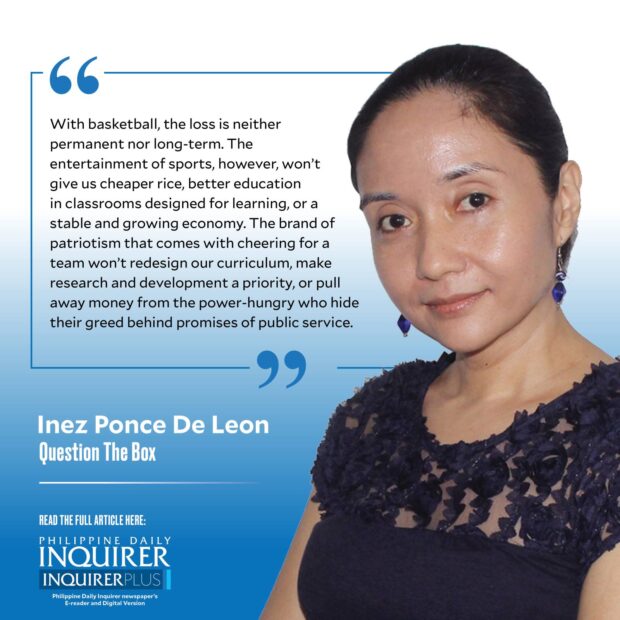The price of waiting
 Gilas Pilipinas, our national basketball team, has filled the headlines—not so much with triumphs, but with disappointing losses. Italy, the Dominican Republic, Angola, and South Sudan all took turns hammering the team. Their only win was against China, and even that was overshadowed by the spectacle of senators performing their version of nationalism by wearing West Philippine Sea shirts.
Gilas Pilipinas, our national basketball team, has filled the headlines—not so much with triumphs, but with disappointing losses. Italy, the Dominican Republic, Angola, and South Sudan all took turns hammering the team. Their only win was against China, and even that was overshadowed by the spectacle of senators performing their version of nationalism by wearing West Philippine Sea shirts.
Online, fans lambasted coach Chot Reyes. Their passion on social media prompted several observers to remark, in varying versions: If only we were this critical and demanding of our politicians, then maybe we’d have a better country.
On the surface, the critique is true: Had we had more voters who were skeptical about irrationally cheap rice, and more citizens clamoring for transparency in the face of confidential funds, then maybe we’d have a country to be proud of.
Article continues after this advertisementThere is, however, more to the “I cheer for this and not that” assumption pervading the critique of fans. It’s tied to something that dominated my findings when I did research on communities affected by Supertyphoon “Yolanda,” and how they understood weather warnings.
People didn’t heed warnings because they had never experienced a storm of great magnitude. They could not imagine what a Signal No. 4 storm would be like, for example, after having experienced a Signal No. 3 storm. They couldn’t project worst-case scenarios. They had to experience something first in order to understand it.
A warning, therefore, was ineffective UNLESS people had already experienced the full fury and disaster that a storm could bring. It did not matter whether they understood the science, or if the warning was written or announced in their language. Without prior, exact experience, a warning was simply speculation, not an order.
Article continues after this advertisementWhat they had was an air of waiting: They waited to feel what the storm would be like, whether it was a meters-high surge or waist-deep floods. They waited until they could feel the wind rattling their joints, the floods rising, their neighbors leaving, their houses falling apart.
“To see is to believe,” a participant once quipped.
Years ago, Gilas critics warned that there would be losses in the future if there wasn’t, among other things, a more deliberate use of game statistics to see how players could up their ante. Some lambasted this idea online, saying that Filipinos did not have such a culture, that everyone just had to wait and see.
Then the World Cup, and then the losses. People finally saw that what they had waited for wasn’t performing at the level of the world’s standards. Whole teams with precise defense and accurate offense came barreling down, exposing Gilas’ lack of practice sessions together and its spotty teamwork. The stats on rebounds and assists were dismal.
Now that people have experienced the loss, they realize what the warnings meant.
The air of waiting is rampant, as well, in governance: voters wait on promises, even if those promises are irrational, without basis, unbelievable. When warned about the consequences of their decision, people disengage; yet again, it’s wait and see, give the candidate a chance. Vote now, regret it later.
Some might mistakenly label this idea of waiting as “hope.” Hope, however, is not the first or only tool in a time of great difficulty. It is what one cultivates across time, as one works on everything systematically, top to bottom, start to finish, ensuring that one has done everything strategically to make an outcome as ideal as possible. This is true, regardless of whether risk management, sports strategies, or voting is being discussed.
Others might say that it’s all about heart, the much-vaunted “puso.” Heart, however, does not mean recklessness, but discernment, compassion, sympathy, empathy. Had the game been about sheer force, then we should have used the phrase “hyperactive butts” instead.
In the same manner, it’s easy to romanticize “resilience,” but it shouldn’t take the place of good governance and accountability. It’s also easy to romanticize the idea of giving people a chance to serve the country; but if it means giving a chance to people with no record of tangible public service—or worse, a falsified record of achievements—then we’re not giving chances. We’re gambling on a losing hand. We’re walking blindly. We’re jeopardizing the next generation, all because we closed our eyes and ears to the plain truth screaming at us in the face.
With basketball, the loss is neither permanent nor long-term. The entertainment of sports, however, won’t give us cheaper rice, better education in classrooms designed for learning, or a stable and growing economy. The brand of patriotism that comes with cheering for a team won’t redesign our curriculum, make research and development a priority, or pull away money from the power-hungry who hide their greed behind promises of public service.
And the waiting? It also betrays the preponderance of intellectual laziness and a national lack of imagination.
iponcedeleon@ateneo.edu
















